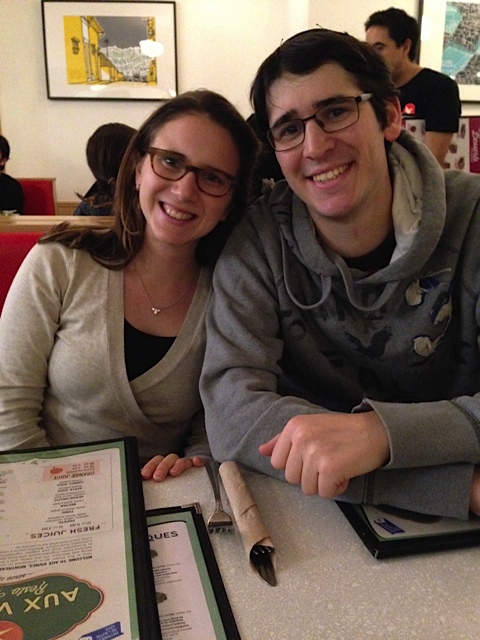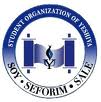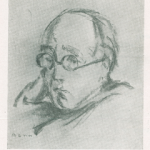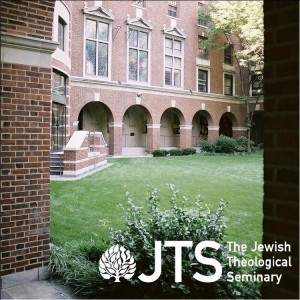The event held in Jerusalem this month by the gay Orthodox group Havruta, to mark its first anniversary, seemed to many participants like a dream come true, a giant step for Israeli Orthodox society. By the end of the evening many felt, for the first time in their lives, that the inevitable clash between their two identities – being both gay and religiously observant – might not necessarily entail brutal disengagement from one of them. But even before the main event began, the auditorium was the scene of a seemingly inconsequential encounter that profoundly shook the worlds of two individuals. It involved the guest of honor, Rabbi Yaakov Medan, a leading figure at a well-known Zionist Orthodox yeshiva, and someone who had been his pupil until a few years ago, Eyal Amir.
Amir was an outstanding student at Har Etzion, the hesder yeshiva (combining Torah studies with military service) in Alon Shvut, which Rabbi Medan co-heads. Amir maintained close ties with the rabbi even after leaving the yeshiva, but never told him what he had already told several other rabbis. Only just prior to the convention did Medan find out that his former star pupil was the gay Orthodox panelist who was to sit beside him on the dais. In the corner of the hall, as it filled up, Medan embraced Amir like a father would.
“I told him I felt really embarrassed, and he said he only came because of me,” Amir recounted afterward. Medan added: “I found out about him only three weeks ago, and that is why I decided to come. He is flesh of my flesh. I decided that I must strengthen him. It was a very difficult moment, but very genuine. I only came because I realized that his problem is my problem – that I am not exempt by any means from dealing with it, from lending a hand, from doing everything I can for him.”
Two other rabbis took part in the Havruta event: Mordechai Vardi of Kibbutz Rosh Tzurim and the Orthodox Ma’aleh School of Television and Film in Jerusalem, and Yehoshua Engelman, rabbi of the Yakar study center in Tel Aviv; both already had experience dealing with the issue of Orthodox homosexuals. The other panelists were Orthodox journalist Bambi Sheleg, editor of the magazine Eretz Acheret, and Amir, who helped found Havruta.
A respected figure in fairly conservative circles, Rabbi Medan surprised people by agreeing to appear at the conference despite efforts by colleagues to dissuade him. Throughout most of the evening he referred to gays as people “of contrary inclination,” the usual term used by rabbis. But toward the end, he said, referring to the loneliness experienced by many in the audience: “A homosexual person’s best friend is the Holy One, blessed is he.”
Earlier, after watching a play called “18 Kodesh,” which opened the event, Medan commented: “I am not and never have been in this public’s position. I feel that the degree of faith required of this precious public is one I have never been called upon to attain, and perhaps will not attain.”
Here, evidently, was the groundbreaking essence in Medan’s stance as a man of halakha (Jewish religious law): Unlike a majority of rabbis, he did not relate to homosexuality as a “preference” or choice that involves sinning and rebelling against God. Although he noted that the inclination may differ from one person to another, he acknowledged that it might be a “natural state” that does not involve any choice.
The auditorium was too small to contain the dozens of Orthodox homosexuals who wanted to attend the conference. There were very young hesder yeshiva students and soldiers, a few older married men, wearing knitted skullcaps of various styles, colors and sizes, and also men who have stopped wearing skullcaps, but still consider themselves part of the community. There was also a group of Orthodox lesbians and three young ultra-Orthodox men. All came to hear and discuss burning issues in their lives – starting with faith and halakha, including political identity (as the event took place before the election, the urgent question was, “Whom do we vote for? The National Religious Party? Meretz?”), and ending with life in Zionist Orthodox society, part of which is growing increasingly pious while another part settles into bourgeois complacency.
Drawing distinctions
During the panel discussion, Rabbi Engelman maintained that prejudice “is an evil sickness that the Orthodox public as a whole is facing,” while Amir lamented that Orthodox society “has created for itself a pleasant, ‘it’s all good’ religious life,” while he, as a gay man, “is on the outside, and that generates tough questions every morning: Do I pray today? What for? You face these questions like you would a daily chore. I’m in close contact with the Holy One, blessed is he. I must make an effort, must be attentive.”
Changes in the self-perception of gay Orthodox people, here and abroad, have occurred in stages, commented Zeev Shveidel, a journalist and member of Havruta, after the conference. One turning point was the 2001 American documentary film “Trembling Before G-d,” which followed the lives of Orthodox gays and lesbians. Another was the introduction of online Israeli discussion sites, which gave rise to groups such as Bat Kol, an organization for Orthodox lesbians, and Havruta, established by graduates of hesder yeshivas and Orthodox mekhinot (army-preparatory programs). Yet another development was the emergence in the press, including the religious-oriented media, of eloquent, openly gay spokespeople, such as Avigail Sperber of Bat Kol; Chaim Elbaum, who directed the prize-winning film “And Thou Shalt Love” while studying at Ma’aleh film school; and Shveidel, whose articles have appeared in the conservative newspaper Makor Rishon, among other places.
Havruta members say their organization does indeed provide an outlet for free expression, but also invests seriously in community-building activities, as described on its Web site (havruta.org.il). Some members have come out to their families, rabbis or friends, but they say that fewer than 10 percent are fully out of the closet. Havruta and Bat Kol have been holding meetings with rabbis in an effort to gain recognition for their groups from the religious establishment. Members emphasize that their activity is “a quiet declaration that if rabbis do not sit down in earnest to confront the issue, reality will do it for them. Orthodox homosexuals are spearheading the change themselves.”
From a classic halakhic standpoint, the ban on homosexuality is emphatic, categorical. There is and probably will never be a rabbi who will permit something the Torah and halakha so absolutely forbid – something most of the people at the Havruta event knew ahead of time, even when the rabbis were invited to be panelists.
Medan, for his part, did not try to gloss over the matter. He emphasized that he draws a distinction between Orthodox people of “contrary inclination,” and “the act” that stems from it; between the need to accept homosexuals as equal members of the Orthodox community, and the halakhically proscribed element of their sexual identity. “There needs to be a clear-cut division between the act and the person. Blurring this difference could lead us to grave things,” he said.
His favorable comments about “conversion therapy” – treatment aimed at “helping to overcome the tendency” – angered his audience. One speaker said that many of those present had endured such agonizing processes, and provided business for a whole battalion of psychologists who work in this field. “Will I have to be strung up on the cross before I’m all right in the rabbi’s eyes?” the speaker asked, noting the dangers inherent in these therapies, such as depression and suicide.
Medan acknowledged that such treatment is not always beneficial, but insisted that “a person must stand before the Holy One, blessed is he, with a clean heart, and say: ‘I have done all I can.'” The rabbi expressed his hope that the day will come when Orthodox society will open its doors to homosexuals “with great love,” and added that it is important that Orthodox gay and lesbian organizations exist. By implication, it seemed to some present, Medan was calling for Orthodox homosexuals to come out of the closet.
Shveidel warned against reading too much into this. “We must not develop exaggerated expectations – that some rabbi will suddenly issue sweeping halakhic permission and marry us. That isn’t going to happen,” he said.
“But if we carry on persistently in the effort of continuing to come out of the closet, of interviews in the media, of conversations with rabbis, with colleagues, with friends, of spreading more light – in the end, a social conception will be formed, and at long last maybe change will also come from halakha. Halakha applies to the real world. From that perspective, the change is completely up to us. There is a lot of work to be done, but [to paraphrase the words of Rabbi Abraham Isaac Kook] the eternal people is not afraid of a long road.”




